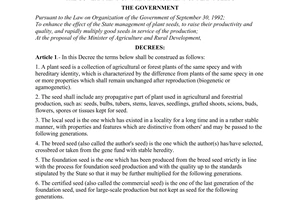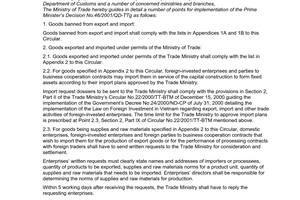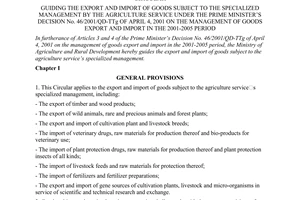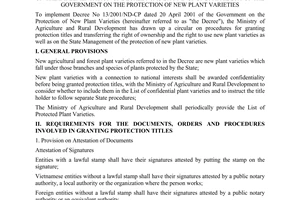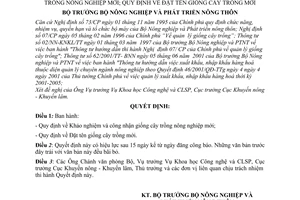Nội dung toàn văn Decision No. 52/2003/QD-BNN promulgating the regulation on testing and recogniti
|
THE
MINISTER OF AGRICULTURE AND RURAL DEVELOPMENT |
SOCIALIST
REPUBLIC OF VIET NAM |
|
No. 52/2003/QD-BNN |
Hanoi, April 02, 2003 |
DECISION
PROMULGATING THE REGULATION ON TESTING AND RECOGNITION OF NEW AGRICULTURAL PLANT VARIETIES AND THE REGULATION ON NAMING OF NEW PLANT VARIETIES
THE MINISTER OF AGRICULTURE AND RURAL DEVELOPMENT
Pursuant to the Government’s Decree No. 73/CP of November 1, 1995 defining the functions, tasks, powers and organizational apparatus of the Ministry of Agriculture and Rural Development; Decree No. 07/CP of February 5, 1996 on management of plant varieties; the Agriculture and Rural Development Minister’s Circular No. 02/NN-KNKL/TT of March 1, 1997 guiding the implementation of Decree No. 07/CP of February 5, 1996 on management of plant varieties and Circular No. 62/2001/TT-BNN of June 5, 2001 guiding the export and import of goods subject to specialized agricultural management under the Prime Minister’s Decision No. 46/2001/QD-TTg of April 4, 2001 on the management of goods export and import in the 2001-2005 period;
At the proposals of the directors of the Science, Technology and Product Quality Department and the Agriculture and Forestry Promotion Department,
DECIDES:
Article 1.- To promulgate:
- The Regulation on testing and recognition of new agricultural plant varieties;
- The Regulation on naming of new plant varieties.
Article 2.- This Decision takes effect 15 days after its publication in the Official Gazette. All previous documents contrary to this document are hereby annulled.
Article 3.- The director of the Ministry’s Office, the director of the Science, Technology and Product Quality Department and the director of the Agriculture and Forestry Promotion Department, the heads and their concerned units shall have to implement this Decision.
|
|
FOR
THE MINISTER OF AGRICULTURE AND RURAL DEVELOPMENT |
REGULATION
ON TESTING AND RECOGNITION OF NEW AGRICULTURAL PLANT
VARIETIES
(Promulgated together with Decision No. 52/2002/QD-BNN of April 2, 2003)
Article 1.- Objectives
1.1. This Regulation defines the responsibilities of the concerned organizations and individuals; the order and procedures for testing and recognition of new agricultural plant varieties in order to enhance the State management over the work of testing and recognizing new agricultural plant varieties.
1.2. Testing and recognition of new agricultural plant varieties aim to draw up a list of plant varieties permitted for production and trading, to raise efficiency and minimize risks for peasants using new plant varieties.
Article 2.- Subjects and scope of application
- Subjects of application are organizations and individuals involved in the testing and recognition of new agricultural plant varieties.
- The scope of application covers all new agricultural plant varieties selected and created at home or imported, which must, before being put into mass production, be tested and recognized for inclusion in the list of plant varieties permitted for production and trading.
Article 3.- Interpretation of terms
In this Regulation, the following word phrases are construed as follows:
3.1. Official testing is a form of testing conducted by specialized agencies recognized or designated by the Ministry of Agriculture and Rural Development (referred to as the testing agencies for short) for new plant varieties of all organizations or individuals according to uniform regulations.
3.2. Breeder testing is a form of testing conducted by organizations or individuals themselves according to uniform regulations under the supervision by competent agencies.
3.3. DUS testing is the process of evaluating the distinctness, uniformity and stability of new varieties according to the DUS testing regulations for each plant species.
3.4. VCU testing is the process of evaluating the value of cultivation and use of new varieties according to the VCU testing regulations for each plant species. The value of cultivation and use of new varieties means all the characteristics related to the productivity, quality, resistance against pests and unfavorable conditions, and capability to produce seeds…
3.5. Temporarily recognized varieties (previously called regionalized varieties) are new agricultural plant varieties having undergone official testing or breeder testing, meeting the set criteria and thus temporarily recognized by the Ministry of Agriculture and Rural Development.
3.6. Trial production is the process of production with temporarily recognized varieties on a given land area under the mass production conditions.
3.7. Officially recognized varieties (previously called national and technically advanced varieties): are new agricultural plant varieties having gone through trial production, meeting the set criteria and officially recognized by the Ministry of Agriculture and Rural Development.
Article 4.- Testing forms:
4.1. Official testing: The plant varieties of the following species must be subject to official testing:
- Food crops: rice and maize;
- Vegetable: tomato;
- Short-term industrial plants: peanut, soybean;
- Long-term industrial plants: Tea, coffee;
- Fruit trees: Orange, pineapple.
4.2. Breeder testing: Plant varieties of species not subject to official testing (Section 4.1) shall be subject to breeder testing.
4.3. The Minister of Agriculture and Rural Development shall decide to add to or remove agricultural plant varieties from the list of those subject to official testing according to production requirements.
Article 5.- Testing order and procedures
Responsibilities of organizations and individuals making registration for testing
5.1. For organizations and individuals making registration for official testing
a/ To submit dossiers of registration for testing to the Agriculture and Forestry Promotion Department.
b/ To sign contracts with the testing agencies according to the current regulations.
c/ To submit reports on the testing results to the Science, Technology and Product Quality Department and report, together with the testing agencies, on the testing results before the Science and Technology Council of the Ministry of Agriculture and Rural Development.
5.2. For organizations and individuals making registration for breeder testing
a/ To submit the dossiers of registration for testing and other related documents to the Agriculture and Forestry Promotion Department.
b/ To conduct testing according to the current regulations.
c/ To submit reports on the testing results to the Science, Technology and Product Quality Department and report on the testing results before the Science and Technology Council of the Ministry of Agriculture and Rural Development.
5.3. For organizations and individuals making registration for testing plant varieties for which testing regulations are not available
a/ To formulate by themselves the testing regulations and reach agreement thereon with the Central Center for Testing Plant Varieties before testing.
b/ To submit reports on the testing results to the Science, Technology and Product Quality Department and report on the testing results before the Science and Technology Council of the Ministry of Agriculture and Rural Development.
Article 6.- Trial production order and procedures
Organizations and individuals with varieties put into trial production shall:
- Sign contracts with units and/or individuals for trial production.
- Report on the trial production acreage and sites to the Agriculture and Forestry Promotion Department, the Central Center for Testing Plant Varieties and the concerned provincial/municipal Agriculture and Rural Development Services.
- Send reports on the trial production results to the Science, Technology and Product Quality Department and report on the testing results before the Science and Technology Council of the Ministry of Agriculture and Rural Development.
Article 7.- Variety recognition order, procedures and criteria
7.1. Temporary recognition
7.1.1. Order and procedures:
a/ If new varieties, after being tested, meet the set criteria, organizations and individuals having such varieties shall compile dossiers of application for temporary recognition and send them to the Science, Technology and Product Quality Department. Such a dossier comprises:
- The application for temporary recognition;
- The testing agency’s report on the testing results.
- The opinion of the Agriculture and Forestry Promotion Department.
b/ Basing himself/herself on the conclusion of the Science and Technology Council, the Minister of Agriculture and Rural Development shall decide to temporarily recognize new agricultural plant varieties.
c/ The temporary recognition duration shall not exceed three crops for short-term plants and three consecutive harvesting crops for long-term plants.
7.1.2. Temporary recognition criteria:
a/ New varieties meet the distinctiveness, uniformity and stability (DUS) criteria.
b/ New varieties have a better value of use and cultivation than control varieties, demonstrated in at least one of the following aspects:
- Productivity is higher by 10% or more, or
- Quality (nutrition, consumption, export, processing…) is markedly better, or
- Having good agronomic properties such as suitable growth duration, resistance against pests as well as collapse under unfavorable external conditions (drought, water-logging, heat, coldness, alum, salinity…),
c/ New varieties have their names compliant with the Agriculture and Rural Development Ministry’s Regulation on naming new plant varieties.
d/ The acreage for temporary recognition complies with the regulations in Appendix 2.
7.2. Official recognition
7.2.1. Order and procedures
a/ Temporarily recognized varieties shall be permitted for trial production in appropriate ecological regions. If the varieties meet the set criteria after trial production, the organizations and individuals having such varieties shall compile dossiers of application for official recognition, then send them to the Science, Technology and Product Quality Department. Such a dossier comprises:
- The application for official recognition;
- The report on the trial production results and technical processes;.
- The opinion of the Agriculture and Forestry Promotion Department;
- The evaluation of the provincial/municipal Agriculture and Rural Development Service of the locality where trial production is conducted;
- The opinions of other organizations and/or individuals (if any).
b/ New varieties may be proposed for exceptional recognition if the testing results show that they are exceptionally excellent or if they meet the criteria for official recognition after 1 or 2 crops, for short-term plants, or after 1 or 2 consecutive harvesting crops, for long-term plants.
c/ Basing himself/herself on the conclusion of the Science and Technology Council, the Minister of Agriculture and Rural Development shall decide to officially recognize new agricultural plant varieties.
d/ Organizations or individuals having varieties put into trial production must pay compensations to trial producers for damage caused by such varieties.
7.2.2 Official recognition criteria:
a/ Temporarily recognized varieties still satisfy the criteria at Item 7.1.2.
b/ The trial production acreage meets the requirements specified in Appendix 3.
c/ The provincial/municipal Agriculture and Rural Development Service of the locality where trial production is conducted accepts mass production.
Article 8.- Functions and tasks of concerned agencies
8.1. Agencies under the Ministry of Agriculture and Rural Development
8.1.1. The Agriculture and Forestry Promotion Department: To receive and deal with the dossiers of registration for testing; evaluate them and issue replies thereon within 15 days after receiving the complete and valid dossiers; grant testing permits; supervise the processes of testing and trial production for new agricultural plant varieties.
8.1.2. The Science, Technology and Product Quality Department:
- To receive the dossiers on testing results, trial production, organize the evaluation thereof and submit them to the Minister for recognition of new agricultural plant varieties.
8.1.3. The Central Center for Testing Plant Varieties shall act a coordinating agency in charge of professional matters, assisting the Ministry of Agriculture and Rural Development (the Science, Technology and Product Quality Department and the Agriculture and Forestry Promotion Department) in performing the State management over the testing and recognition of new plant varieties. To guide and supervise organizations and individuals that conduct tests.
8.1.4. The Science and Technology Council of the Ministry of Agriculture and Rural Development shall have to evaluate and advise the Minister on the recognition of new agricultural plant varieties.
8.2. The provincial/municipal Agriculture and Rural Development Services shall coordinate in inspecting, supervising and evaluating the trial production of new agricultural plant varieties within their respective localities.
Article 9.- Charges and fees for testing and recognition of new agricultural plant varieties
When making registration for variety testing and recognition, organizations and individuals owning new agricultural plant varieties shall have to pay charges and fees according to the current regulations.
Article 10.- Implementation provisions
All organization and individuals involved in the testing and recognition of new agricultural plant varieties shall have to strictly comply with this Regulation. If they commit violations, thus causing adverse consequences to production, they shall be sanctioned according to law provisions.
APPENDIX 2.
MAXIMUM TOTAL PRODUCTION ACREAGE UNDER TESTING
|
Ordinal number |
Plant species |
Acreage (ha) |
|
1 |
Food and foodstuff plants |
|
|
|
- Rice, maize |
100 |
|
|
- Others |
50 |
|
2 |
Short-term industrial plants |
|
|
|
- Peanut, soybean, cotton |
50 |
|
|
- Green bean, sugarcane |
20 |
|
|
- Others |
10 |
|
3 |
Long-term industrial plants |
|
|
|
- Tea, coffee, rubber, pepper, cashew, cocoa |
10 |
|
|
- Others |
5 |
|
4 |
Fruit trees |
|
|
|
- Mango, durian, longan, litchi, orange and grapefruit |
10 |
|
|
- Others |
5 |
|
5 |
Vegetables |
|
|
|
- Tomato, water melon, cabbage |
10 |
|
|
- Others |
5 |
|
6 |
Flower trees |
5 |
APPENDIX 3.
TOTAL TRIAL PRODUCTION ACREAGE
|
Ordinal number |
Plant species |
Acreage |
|
|
Minimum |
Maximum |
||
|
1 |
Food and foodstuff plants |
|
|
|
|
- Rice under intensive cultivation |
3,000 |
6,000 |
|
|
- Rice in difficulty-hit areas |
500 |
1,000 |
|
|
- Specialty rice |
500 |
1,000 |
|
|
- Maize for use as food |
1,000 |
2,000 |
|
|
- Vegetable maize, sweet maize, white corn |
200 |
400 |
|
|
- Sweet potato, cassava |
200 |
400 |
|
|
- Potato |
100 |
200 |
|
|
- Others |
50 |
100 |
|
2 |
Short-term industrial plants |
|
|
|
|
- Peanut, soybean, cotton |
200 |
400 |
|
|
- Green bean, sugar cane |
100 |
200 |
|
|
- Sesame, sunflower |
50 |
100 |
|
|
- Others |
25 |
50 |
|
3 |
Long-term industrial plants |
|
|
|
|
- Tea, coffee, rubber, pepper, cashew, cocoa |
50 |
100 |
|
|
- Others |
25 |
50 |
|
4 |
Fruit trees |
|
|
|
|
- Mango, durian, longan, litchi, orange, grapefruit |
10 |
20 |
|
|
- Others |
5 |
10 |
|
5 |
Vegetables |
|
|
|
|
- Tomato |
|
|
|
|
- Watermelon |
|
|
|
|
- Cucumber, cabbage… |
|
|
|
|
- Others |
|
|
|
6 |
Flower trees |
20 |
40 |
REGULATION
ON NAMING OF NEW PLANT VARIETIES
(Promulgated together with Decision No. 52/2002/QD-BNN-KHCN of April 2,
2003)
Article 1.- Objectives
This Regulation aims to enhance the State management over agricultural and forestry plant varieties; restrict the arbitrary naming as well as use of names
in order to protect the legitimate interests of the breeders of new varieties, variety producers and traders and peasants using new varieties.
Article 2.- Scope and objects of application
This Regulation shall be compulsorily applicable to all new agricultural and forestry plant varieties selected and created by all organizations and individuals at home or imported before they are put into production.
Article 3.- Principles for naming new plant varieties
3.1. Each new plant variety shall have only a single name compliant with this Regulation when being put into production.
3.2. The names of varieties must be easily distinguishable from those of varieties of the same species.
3.3. The following ways of naming shall not be accepted:
a/ Having only numerals;
b/ Breaching social ethics;
c/ Being easy to cause misunderstanding of the varieties’ typical characteristics or the breeders’ identity;
d/ Being identical to or so similar to cause confusion with the trademarks, origin appellations protected for the products; being identical or similar to harvested products of such plant varieties.
3.4. The research agencies may have regulations on giving internal names bearing their own characteristics, which must, however, not be contrary to this Regulation.
3.5. For imported varieties, if not experiencing any effects that modify their hereditary nature as compared to their original materials, their original names must be used; for special cases, the approval of the Ministry of Agriculture and Rural Development must be obtained.
3.6. The names of the plant gene sources, materials selected for creation of new varieties, parental lines of new varieties must also comply with the above- said principles.
Article 4.- Order and procedures for naming varieties
4.1. The names of new plant varieties shall be given by their owning organizations or individuals and submitted to the following related organizations:
a/ For agricultural plant varieties
Agricultural plant varieties subject to testing: Their names shall be submitted to the Science, Technology and Product Quality Department upon submission of the dossiers of registration for testing.
b/ For forestry plant varieties: Their names shall be submitted to the Science, Technology and Product Quality Department before being considered for recognition (according to the forestry plant variety recognition criteria No.124/1998/QD/BNN/KHCN of August 31, 1998 of the Ministry of Agriculture and Rural Development).
c/ For new agricultural and forestry plant varieties applied for protection: The organizations or individuals owning new varieties shall submit the names of such varieties to the Protection Bureau when submitting the dossiers of application for the granting of protection titles (according to Circular No.119/2001/TT-BNN of December 21, 2001 guiding the implementation of the Decree on protection of new plant varieties).
4.2. After examining, if finding that the variety names are not compliant with Article 3 above, the dossier-receiving agencies must notify the dossier submitters thereof. The dossier submitters shall have to give other names within 15 days after receiving such notifications. If, past the above-said time limit or the modified variety names are still incompliant, the dossier-receiving agencies shall be entitled to refuse to consider such dossiers.
4.3. The specialized Science Councils of the Ministry of Agriculture and Rural Development shall approve the variety names when considering for temporary recognition. These names shall be publicized in a specialized magazine. The publicized variety names shall be the official names of the new varieties and must neither be modified nor arbitrarily used without permission.
Article 5.- Functions and tasks of concerned agencies
5.1. The Minister of Agriculture and Rural Development assigns:
a/ The Science, Technology and Product Quality Department to perform the State management over plant variety names nationwide.
b/ The Central Center for Testing Plant Varieties to act as a coordinating agency in charge of professional and technical matters to assist the Ministry of Agriculture and Rural Development (the Science, Technology and Product Quality Department) in uniformly managing the plant variety names nationwide.
5.2. The provincial/municipal Agriculture and Rural Development Services shall perform the State management over the plant variety names within their respective provinces or cities under the assignment of the Ministry of Agriculture and Rural Development in accordance with this Regulation.
Article 6.- Implementation provisions
All concerned organizations and individuals must, according to their functions and powers, strictly implement this Regulation. If breaching this Regulation, thus causing adverse consequences to production, they shall be sanctioned according to law provisions.

